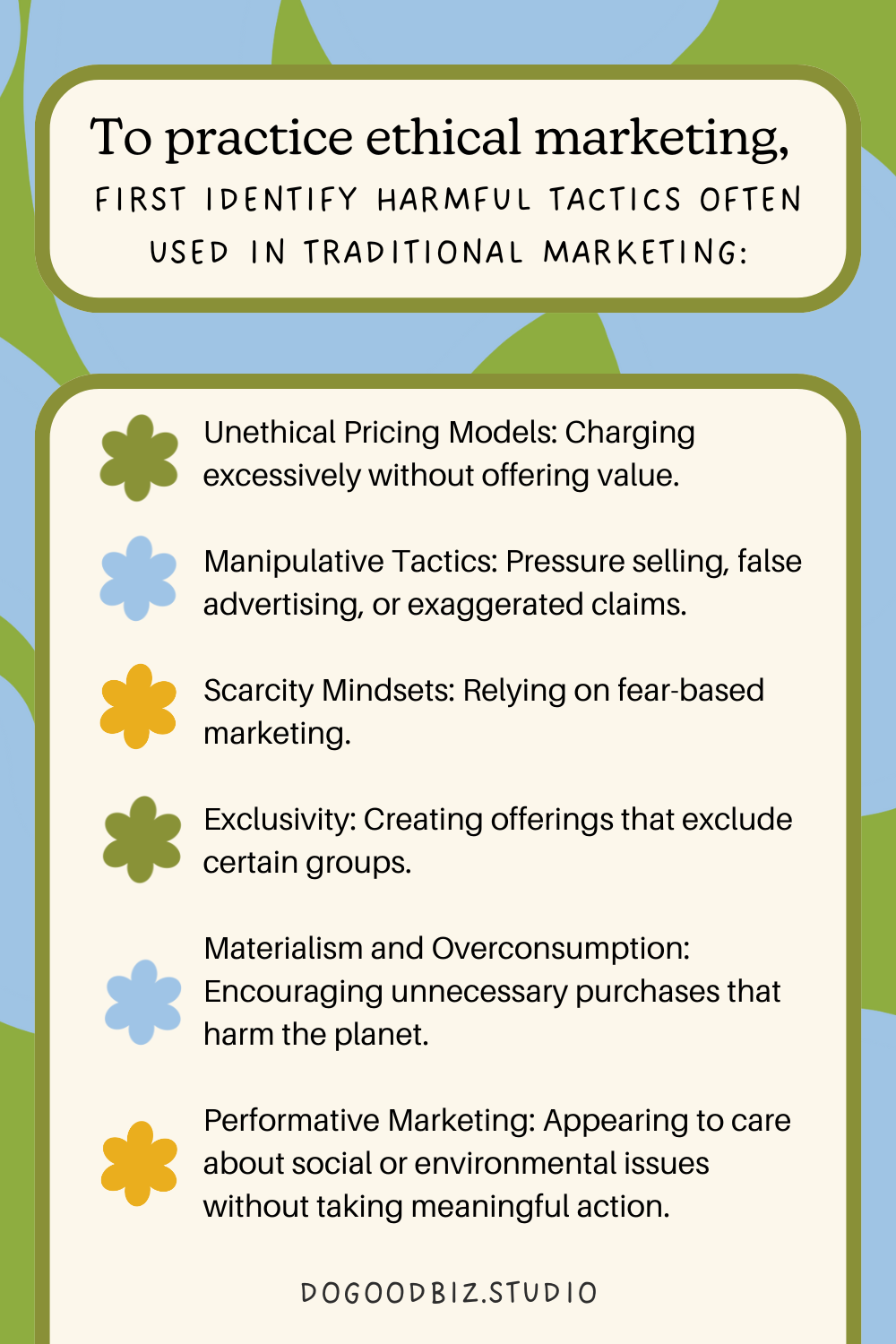The Essentials of Ethical Marketing: How to Practice Conscious Marketing
Businesses that embrace ethical marketing are not just making a statement—they’re setting a standard. As consumers grow increasingly mindful of the brands they support, conscious marketing has become essential for fostering trust, loyalty, and meaningful connections. If you’re ready to align your marketing practices with your values, this guide will help you understand ethical marketing principles and how to integrate them into your business strategy.
What Is Ethical Marketing?
Ethical marketing involves promoting and selling products or services in ways that prioritize honesty, transparency, and responsibility. Unlike traditional marketing, which often focuses solely on profits, ethical marketing centers on serving and supporting communities with integrity, compassion, and long-term sustainability.
Instead of asking, “How can I make the most money?” ethical marketers ask, “How can I serve my community and create a positive impact?”
Why Ethical Marketing Matters
With societal and environmental issues at the forefront, consumers are demanding more from businesses. They’re looking for brands that align with their values, practice sustainability, and take accountability for their actions.
Trust and Transparency: Ethical marketing builds trust by being honest and clear about your intentions, products, and practices.
Long-Term Relationships: Prioritizing community needs fosters loyalty and mutual respect, creating an environment of reciprocity.
Sustainability: Ethical marketing considers the well-being of people and the planet, ensuring actions taken today support future generations.
Common Harmful Marketing Practices to Avoid
To practice ethical marketing, you must first identify harmful tactics often used in traditional marketing. Reflect on whether your current strategies unintentionally cause harm:
Unethical Pricing Models: Charging excessively without offering value.
Manipulative Tactics: Pressure selling, false advertising, or exaggerated claims.
Scarcity Mindsets: Relying on fear-based marketing.
Exclusivity: Creating offerings that exclude certain groups.
Materialism and Overconsumption: Encouraging unnecessary purchases that harm the planet.
Performative Marketing: Appearing to care about social or environmental issues without taking meaningful action.
Ethical marketing asks you to replace these tactics with transparency, fairness, and intentionality.
“Good ethics is a core aspect of conscious marketing. We must admit to ourselves that unethical marketing tactics harm society and the planet as a whole and commit to establishing new marketing policies as well as standards with the hope of reducing said harms. When we embrace ethical values as conscious marketers, we put priority on marketing in a way that is fully transparent, honest, responsible, fair, compassionate, and ethical.”
Types of Conscious Marketing to Consider:
Consumer-Oriented Marketing
Focus on your audience's needs and desires, both now and in the future.
Build strategies that serve your community with sensitivity and empathy.
Customer Value Marketing
Create value-driven initiatives that emphasize trust and loyalty.
Offer consistent improvements in your products or services to meet evolving needs.
Innovative Marketing
Continuously assess and improve your strategies, products, and messaging.
Be open to learning, unlearning, and growing as societal expectations shift.
Mission-Driven Marketing
Build campaigns aligned with a larger social purpose beyond profit.
Highlight how your business contributes to societal and environmental well-being.
Building an Ethical Marketing Strategy
An ethical marketing strategy goes beyond creating content; it requires thoughtful planning, intentional messaging, and a human-centered approach. Here’s how to start:
1. Conduct Market Research
Understand your audience’s needs, preferences, and pain points.
Evaluate how your products or services can genuinely support them.
2. Develop Transparent Pricing Models
Ensure your pricing reflects the true value of your offerings.
Avoid inflated costs or hidden fees that erode trust.
3. Create Inclusive Messaging
Use language and imagery that respect and uplift diverse communities.
Avoid stereotypes or exclusionary content.
4. Choose Sustainable Practices
Implement eco-friendly packaging, delivery methods, and production processes.
Share your sustainability efforts openly to inspire others.
5. Map Out Your Customer Journey
Define how you’ll attract, engage, and nurture relationships with your community.
Focus on creating a positive experience at every touchpoint.
Key Questions to Ask About Your Marketing
Use these prompts to evaluate the ethics of your marketing efforts:
Does my messaging reflect my brand’s mission and values?
Am I using honest, transparent, and compassionate language?
Are my products and services accessible and inclusive?
How am I contributing to the well-being of society and the planet?
Am I unintentionally causing harm through my pricing, advertising, or delivery methods?
How Ethical Marketing Impacts Your Business
Ethical marketing benefits your business, community, and the planet:
Builds Trust: Transparency fosters loyalty and credibility.
Creates Long-Term Value: Ethical practices enhance your reputation and strengthen relationships.
Promotes Sustainability: Aligning with social and environmental goals ensures your business supports a healthier future.
Want to Start Practicing Ethical Marketing?
We’re here to help! Whether you need guidance on strategy, tools to support your efforts, or hands-on assistance, we offer services tailored to your business’s unique needs.
Until next time…
Natalie Brite - DoGoodBiz Studio



